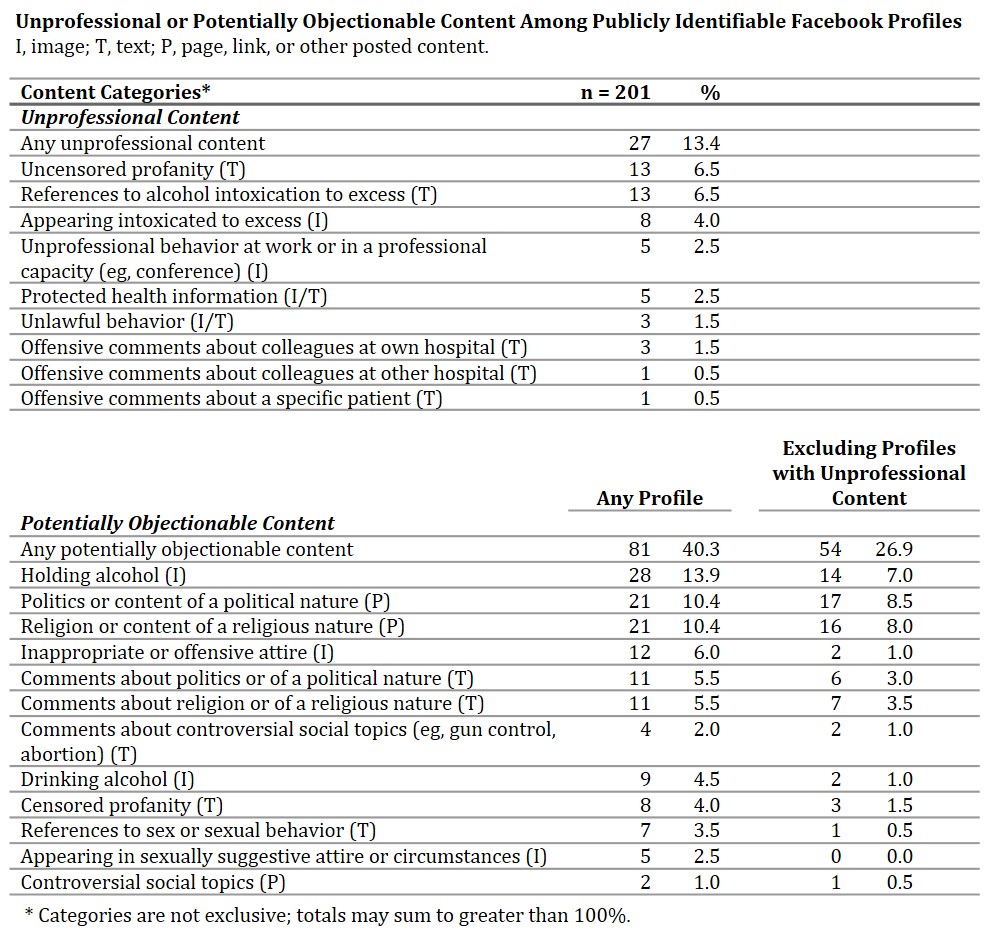Back to 2016 Annual Meeting
Unprofessional Content on Social Media Among New England and U.S. Urology Residency Graduates
Kevin Koo, MD, MPH, MPhil, Zita Ficko, MD, MS, E. Ann Gormley, MD.
Dartmouth-Hitchcock Medical Center, Lebanon, NH, USA.
BACKGROUND: The AUA has encouraged social media engagement by urologists and published best practices for online professionalism. Facebook is a popular platform that was introduced to most current trainees prior to medical school and can now be accessed by anyone, including patients and employers. As trainees graduate to clinical practice, potentially unprofessional behavior on social media is a concern. This study characterizes the social media content of a national sample of urology residency graduates.
METHODS: Facebook was queried in 7/2015 with the names of all 2015 U.S. urology residency graduates to identify public profiles accessible without being “friends.” Profiles were assessed for unprofessional (UP) or potentially-objectionable (PO) content using a rubric with 65 content categories based on guidelines by the ACGME, AMA, and AUA. We noted references to urology/urological organizations and determined whether UP/PO content was self-authored by the urologist or posted by another party. Assessments were conducted by two independent reviewers with excellent concordance (Ƙ>0.90). A subgroup analysis was conducted for graduates of programs in the New England Section of the AUA.
RESULTS: Of 281 graduates, 223 (79%) were men and 267 (95%) held MDs. 201 (72%) had publicly-identifiable Facebook profiles. Of these, 81 profiles (40%) included unprofessional or potentially-objectionable content, including 27 profiles (13%) with explicitly UP behavior (Table). Common examples of UP content included images of and references to intoxication, images of being unprofessional at work, explicit profanity, and protected health information. PO content included images of possession or consumption of alcohol, images or posts about political, religious, or controversial topics, and references to sexual behavior. UP/PO content was self-authored in 82% of categories. 30% of profiles contained self-identification as urologists or had references to urological organizations like the AUA, but among these, 47% contained UP/PO content. Presence of UP/PO content did not differ significantly between sexes, MD vs. DO, allopathic vs. osteopathic/military residency programs, or with vs. without identifying as urologists (all p>0.05). Among the 22 graduates of New England programs, 16 (73%) had publicly-identifiable profiles. Of these, seven (44%) contained self-authored UP/PO content. Seven profiles contained references to urology or identification as a urologist, and three of these (43%) contained UP/PO content. No statistical difference was found between New England vs. all U.S. residents with respect to having a publicly-identifiable profile, authoring UP/PO content, or self-identifying as a urologist with UP/PO content (all p>0.05).
CONCLUSIONS: The majority of recent residency graduates had public Facebook profiles, and a substantial proportion contained self-authored, unprofessional content. Of those residents identifying as urologists, about half violated AUA guidelines on online professionalism. The social media behavior of graduates of New England programs was similar to their counterparts nationally. Greater awareness of trainees’ online identities is needed.

Back to 2016 Annual Meeting
|
|
|




